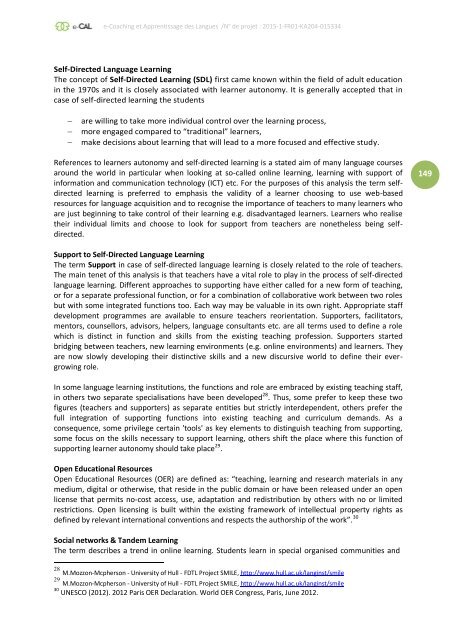e-CAL - e-Coaching et Apprentissage des Langues
The ERASMUS+ project e-CAL presents the result of an analysis of support methods in the case of language learning using web-based Open Educational Resources (OER).
The ERASMUS+ project e-CAL presents the result of an analysis of support methods in the case of language learning using web-based Open Educational Resources (OER).
You also want an ePaper? Increase the reach of your titles
YUMPU automatically turns print PDFs into web optimized ePapers that Google loves.
e-<strong>Coaching</strong> <strong>et</strong> <strong>Apprentissage</strong> <strong>des</strong> <strong>Langues</strong> /N° de proj<strong>et</strong> : 2015-1-FR01-KA204-015334<br />
Self-Directed Language Learning<br />
The concept of Self-Directed Learning (SDL) first came known within the field of adult education<br />
in the 1970s and it is closely associated with learner autonomy. It is generally accepted that in<br />
case of self-directed learning the students<br />
are willing to take more individual control over the learning process,<br />
more engaged compared to “traditional” learners,<br />
make decisions about learning that will lead to a more focused and effective study.<br />
References to learners autonomy and self-directed learning is a stated aim of many language courses<br />
around the world in particular when looking at so-called online learning, learning with support of<br />
information and communication technology (ICT) <strong>et</strong>c. For the purposes of this analysis the term selfdirected<br />
learning is preferred to emphasis the validity of a learner choosing to use web-based<br />
resources for language acquisition and to recognise the importance of teachers to many learners who<br />
are just beginning to take control of their learning e.g. disadvantaged learners. Learners who realise<br />
their individual limits and choose to look for support from teachers are non<strong>et</strong>heless being selfdirected.<br />
149<br />
Support to Self-Directed Language Learning<br />
The term Support in case of self-directed language learning is closely related to the role of teachers.<br />
The main ten<strong>et</strong> of this analysis is that teachers have a vital role to play in the process of self-directed<br />
language learning. Different approaches to supporting have either called for a new form of teaching,<br />
or for a separate professional function, or for a combination of collaborative work b<strong>et</strong>ween two roles<br />
but with some integrated functions too. Each way may be valuable in its own right. Appropriate staff<br />
development programmes are available to ensure teachers reorientation. Supporters, facilitators,<br />
mentors, counsellors, advisors, helpers, language consultants <strong>et</strong>c. are all terms used to define a role<br />
which is distinct in function and skills from the existing teaching profession. Supporters started<br />
bridging b<strong>et</strong>ween teachers, new learning environments (e.g. online environments) and learners. They<br />
are now slowly developing their distinctive skills and a new discursive world to define their evergrowing<br />
role.<br />
In some language learning institutions, the functions and role are embraced by existing teaching staff,<br />
in others two separate specialisations have been developed 28 . Thus, some prefer to keep these two<br />
figures (teachers and supporters) as separate entities but strictly interdependent, others prefer the<br />
full integration of supporting functions into existing teaching and curriculum demands. As a<br />
consequence, some privilege certain 'tools' as key elements to distinguish teaching from supporting,<br />
some focus on the skills necessary to support learning, others shift the place where this function of<br />
supporting learner autonomy should take place 29 .<br />
Open Educational Resources<br />
Open Educational Resources (OER) are defined as: “teaching, learning and research materials in any<br />
medium, digital or otherwise, that reside in the public domain or have been released under an open<br />
license that permits no-cost access, use, adaptation and redistribution by others with no or limited<br />
restrictions. Open licensing is built within the existing framework of intellectual property rights as<br />
defined by relevant international conventions and respects the authorship of the work”. 30<br />
Social n<strong>et</strong>works & Tandem Learning<br />
The term <strong>des</strong>cribes a trend in online learning. Students learn in special organised communities and<br />
28 M.Mozzon-Mcpherson - University of Hull - FDTL Project SMILE, http://www.hull.ac.uk/langinst/smile<br />
29 M.Mozzon-Mcpherson - University of Hull - FDTL Project SMILE, http://www.hull.ac.uk/langinst/smile<br />
30 UNESCO (2012). 2012 Paris OER Declaration. World OER Congress, Paris, June 2012.


